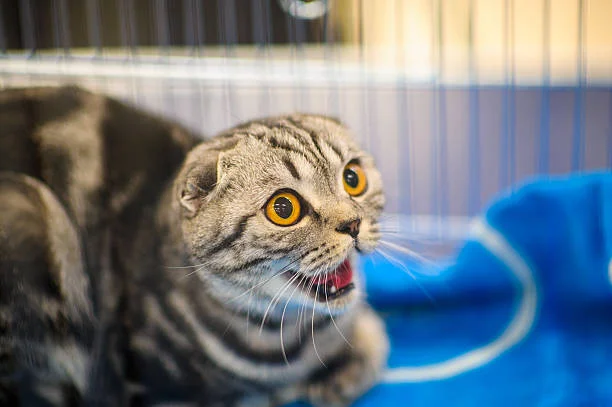Yes, cats can get kennel cough from dogs, although it is relatively rare. Understanding the transmission, symptoms, and prevention of kennel cough in cats is crucial for ensuring the health and well-being of your pets.
Kennel cough, commonly associated with dogs, is a highly contagious respiratory infection that can also affect cats. While it is more prevalent in dogs, cats can contract the disease, particularly in environments where they are in close contact with infected animals. This comprehensive guide will explore how cats can get kennel cough from dogs, the symptoms to watch for, treatment options, and preventive measures to keep your feline friends healthy.
What is Kennel Cough?
Kennel cough, also known as infectious tracheobronchitis, is a respiratory infection caused by a combination of bacteria and viruses. The most common culprit is the bacterium Bordetella bronchiseptica, which can infect both dogs and cats.
Transmission: Kennel cough spreads through airborne droplets, direct contact with infected animals, and contaminated surfaces such as food bowls, toys, and bedding. This makes it highly contagious in environments like shelters, boarding facilities, and multi-pet households.
Can Cats Get Kennel Cough from Dogs?
Yes, cats can get kennel cough from dogs. Although it is less common for cats to contract kennel cough, it is possible, especially if they are in close proximity to an infected dog3. The bacterium Bordetella bronchiseptica is the primary cause of kennel cough in both species, making cross-species transmission feasible.
Symptoms of Kennel Cough in Cats
The symptoms of kennel cough in cats can be similar to those in dogs, but they may also resemble other upper respiratory infections. Common symptoms include:
- Coughing: A persistent, dry cough that may sound like a hacking or honking noise.
- Sneezing: Frequent sneezing, often accompanied by nasal discharge.
- Eye Discharge: Watery or mucous discharge from the eyes.
- Nasal Discharge: Clear, yellow, or green discharge from the nose.
- Fever: Elevated body temperature.
- Lethargy: Reduced energy levels and reluctance to play or move.
- Loss of Appetite: Decreased interest in food.
Diagnosing Kennel Cough in Cats
If you suspect your cat has kennel cough, it is important to seek veterinary care for an accurate diagnosis. The veterinarian may perform the following:
- Physical Examination: Checking for signs of respiratory distress and other symptoms.
- Throat Swab: Collecting a sample from the throat to identify the presence of Bordetella bronchiseptica or other pathogens.
- Blood Tests: Assessing the overall health of the cat and ruling out other conditions.
Treatment Options for Kennel Cough in Cats
Treatment for kennel cough in cats typically involves managing symptoms and addressing the underlying infection. Common treatments include:
- Antibiotics: Prescribed to combat bacterial infections. Doxycycline is a commonly used antibiotic for treating Bordetella bronchiseptica.
- Anti-Inflammatories: Medications to reduce inflammation and fever, making the cat more comfortable.
- Cough Suppressants: Used to alleviate persistent coughing, although they should be used with caution and under veterinary guidance.
- Supportive Care: Ensuring the cat stays hydrated and providing a comfortable, stress-free environment.
Home Care and Management
In addition to veterinary treatment, there are several home care measures you can take to help your cat recover from kennel cough:
- Humidifier: Using a humidifier in the room can help ease respiratory symptoms by keeping the air moist.
- Steamy Bathroom: Allowing your cat to spend time in a steamy bathroom can help clear nasal congestion.
- Nutritious Diet: Offering a high-quality, palatable diet to encourage eating and support the immune system.
- Isolation: Keeping the infected cat isolated from other pets to prevent the spread of the infection.
Preventing Kennel Cough in Cats
Preventing kennel cough involves minimizing exposure to infected animals and maintaining good hygiene practices. Here are some preventive measures:
- Vaccination: While there is a vaccine for Bordetella bronchiseptica in dogs, it is less commonly used in cats. Consult your veterinarian to determine if vaccination is appropriate for your cat.
- Hygiene: Regularly clean and disinfect food bowls, toys, bedding, and other items that your pets come into contact with.
- Avoid Crowded Environments: Limit your cat’s exposure to crowded environments such as shelters and boarding facilities where the risk of infection is higher.
- Quarantine New Pets: When introducing a new pet to your household, keep them separated from other pets for a period to ensure they are not carrying any infections.
Conclusion
Yes, cats can get kennel cough from dogs, although it is relatively rare. Understanding the transmission, symptoms, and prevention of kennel cough in cats is crucial for ensuring the health and well-being of your pets. By following the guidelines and tips provided in this article, you can help protect your feline friends from this contagious respiratory infection.
The photo featured below the post headline is Credit: Zelenenka/istockphoto
I hope you find this post helpful and informative. If Yes’ feel free to share it with your friends!
Frequently Asked Questions
Can cats get kennel cough from dogs?
Yes, cats can get kennel cough from dogs, although it is relatively rare.
What are the symptoms of kennel cough in cats?
Symptoms include coughing, sneezing, eye and nasal discharge, fever, lethargy, and loss of appetite.
How is kennel cough diagnosed in cats?
Diagnosis involves a physical examination, throat swab, and possibly blood tests to identify the presence of Bordetella bronchiseptica or other pathogens.
What treatments are available for kennel cough in cats?
Treatments include antibiotics, anti-inflammatories, cough suppressants, and supportive care such as hydration and a comfortable environment.
How can I prevent my cat from getting kennel cough?
Preventive measures include vaccination, maintaining good hygiene, avoiding crowded environments, and quarantining new pets.

